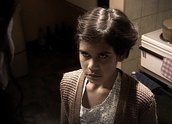


Rosie (2004)
Synopsis
A docudrama stylistically using both interview and dramatic re-enactment to depict the childhood of Rosalie Fraser, an Aboriginal woman who as one of the Stolen Generation, fostered out to a white family as a child and suffered physical, sexual and emotional abuse.
Rosie is part of the Nganampa Anwernekenhe series produced by Central Australian Aboriginal Media Association (CAAMA) Productions. Nganampa Anwernekenhe means 'ours’ in the Pitjanjatjara and Arrernte lanuages, and the series aims to contribute to the preservation of Indigenous languages and cultures.
Curator’s notes
In 1961, at the age of two, Rosalie Fraser was taken from her Aboriginal family by the Western Australian Child Welfare Department and made a ward of the state. This documentary, based on the life of Rosalie Fraser, is a generous personal account of Rosalie’s experience of being removed and placed in foster care as a child. Rosalie and her sister Beverley were taken from their birth mother and placed in the foster care of the Kelly’s, a white family with children of their own. Rosalie and Beverley were abused by their white foster mother, and their lives fractured further when Beverley was taken from the Kelly household. The sisters only reunited through chance many years later.
The assimilation policies that targeted the Aboriginal community in an effort to eradicate Indigenous culture by absorbing Aboriginal people into mainstream society have had a profound effect upon Indigenous peoples. The institutionalisation of Aboriginal peoples throughout history had enduring consequences upon the well-being of Indigenous individuals and their extended family and communities caught up in government policies of the day, many of whom are still attempting to reconcile with their blood families.
For more on the policies that have shaped Aboriginal experience, see also Barani and Stanley Fraser Davies.
The real-life trauma endured by Rosalie Fraser and the determination to not only survive, but to overcome the experience enforced upon her by government policies shows a great strength of spirit. This is a moving documentary offering a human face to the racist policies that destroyed so many Indigenous families. Rosalie Fraser would go on to make an indelible contribution by giving voice to the experiences of the stolen generation as well as her own journey by turning to writing to heal, and from this has written the book Shadow Child (Hale & Iremonger 1999), reviewed at Australian Book Review, Philip Morrissey.
- Overview
- Curator’s notes
- Video 3 clips

- Principal credits
- Find a copy
- Make a comment
- Add your review



